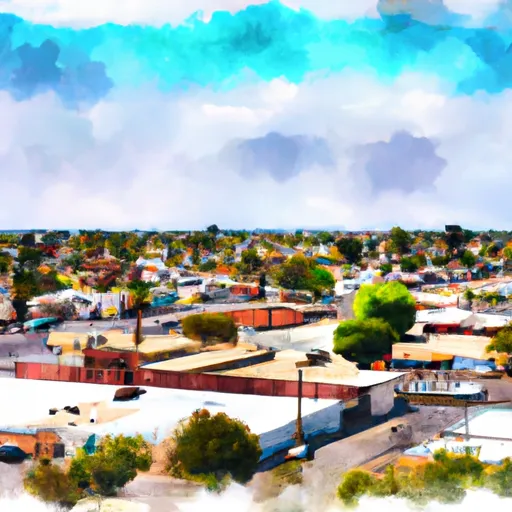-
 Snoflo Premium
Snoflo Premium
Get unlimited access to all our content
With no Ad interruptions! - Start Your Free Trial Login with existing account
Kettleman-City
Eden Index
Climate
8.2
•
Recreation
2.2
•
Community
1.1
•
Safeguard
4.3/10

Kettleman City is a small community located in Kings County, California. It is situated in the San Joaquin Valley, approximately halfway between San Francisco and Los Angeles. The town experiences a Mediterranean climate, characterized by hot and dry summers, and mild and wet winters. Summer temperatures often reach triple digits, while winter temperatures range from the 40s to the 60s Fahrenheit.
Concerning hydrology constituents, Kettleman City relies on groundwater as its primary water source. The area is part of the Central Valley Water Project, which supplies water to local agricultural and municipal users. However, it is worth noting that Kettleman City has faced water quality issues in the past, primarily due to contamination from nearby industrial and agricultural activities. Efforts have been made to address and improve water quality in recent years.
In terms of outdoor recreational opportunities, Kettleman City and its surrounding areas offer various options. The nearby Kettleman Hills are a popular spot for hiking and exploration. There are also several parks and wildlife areas within driving distance, such as the San Luis Reservoir Recreation Area and the Panoche Hills Ecological Reserve, which provide opportunities for camping, fishing, birdwatching, and boating.
What is the Eden Index?
The Snoflo Eden Index serves as a comprehensive rating system for regions, evaluating their desirability through a holistic assessment of climate health, outdoor recreation opportunities, and natural disaster risk, acknowledging the profound impact of these factors on livability and well-being.
Climate Health Indicator (CHI): 8.2
Kettleman-City receives approximately
175mm of rain per year,
with humidity levels near 36%
and air temperatures averaging around
18°C.
Kettleman-City has a plant hardyness factor of
9, meaning
plants and agriculture in this region tend to thrive here all year round.
By considering the ideal temperature range, reliable water supplies, clean air, and stable seasonal rain or snowpacks, the Climate Health Indicator (CHI) underscores the significance of a healthy climate as the foundation for quality living.
A healthy climate is paramount for ensuring a high quality of life and livability in a region, fostering both physical well-being and environmental harmony. This can be characterized by ideal temperatures, reliable access to water supplies, clean air, and consistent seasonal rain or snowpacks.
Weather Forecast
Streamflow Conditions
Tulare-Buena Vista Lakes
Area Rivers
Tulare-Buena Vista Lakes
Snowpack Depths
Tulare-Buena Vista Lakes
Reservoir Storage Capacity
Tulare-Buena Vista Lakes
Groundwater Levels
Recreational Opportunity Index (ROI): 2.2
The Recreational Opportunity Index (ROI) recognizes the value of outdoor recreational options, such as parks, hiking trails, camping sites, and fishing spots, while acknowledging that climate plays a pivotal role in ensuring the comfort and consistency of these experiences.
Access to outdoor recreational opportunities, encompassing activities such as parks, hiking, camping, and fishing, is crucial for overall well-being, and the climate plays a pivotal role in enabling and enhancing these experiences, ensuring that individuals can engage in nature-based activities comfortably and consistently.
Camping Areas
| Campground | Campsites | Reservations | Toilets | Showers | Elevation |
|---|---|---|---|---|---|
| Lemoore Naval Air Station Military | None | 216 ft |
Nearby Ski Areas
Catastrophe Safeguard Index (CSI):
The Catastrophe Safeguard Index (CSI) recognizes that natural disaster risk, encompassing floods, fires, hurricanes, and tornadoes, can drastically affect safety and the overall appeal of an area.
The level of natural disaster risk in a region significantly affects safety and the overall livability, with climate change amplifying these risks by potentially increasing the frequency and intensity of events like floods, fires, hurricanes, and tornadoes, thereby posing substantial challenges to community resilience and well-being.
Community Resilience Indicator (CRI): 1.1
The Community Resilience Indicator (CRI) recognizes that education, healthcare, and socioeconomics are crucial to the well-being of a region. The CRI acknowledges the profound impact of these elements on residents' overall quality of life. By evaluating educational resources, healthcare accessibility, and economic inclusivity, the index captures the essential aspects that contribute to a thriving community, fostering resident satisfaction, equity, and social cohesion.

